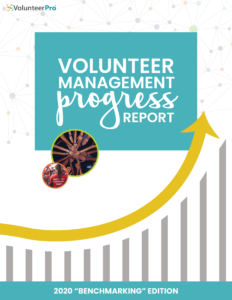 Volunteer Management Best Practices: What You Need to Know
Volunteer Management Best Practices: What You Need to Know
We recently wrapped up a lengthy analysis of the data we collected from our 5th annual, state-of-the-industry survey, which gives us first hand knowledge on volunteer management best practices. We are so inspired by all of the information volunteer management professionals from around the world shared with us.
With this information, we are ALL better able to advocate for our profession and our needs!
In this year’s “Benchmarking Edition,” we explore correlations between volunteer program capacity, resources, and management practices and find some interesting relationships that may have implications in the nonprofit field.
Read on for more information about the research we conducted, what we hoped to learn from this research and we’ll take you through a quick look at some memorable impressions the data has left on us.
About the Research
The survey questionnaire was developed with input from two practitioners and a scholar, designed to include 30-34 (depending on country) closed and open-ended questions; most questions were optional.
A total of 1,744 volunteer administrators (paid & volunteer) from 22 countries responded; 71 were disqualified because they did not work directly with volunteers, and 1,328 completed most of the questionnaire.
The survey was available globally and promoted widely to previous respondents. All respondents to this survey are still working in volunteerism, so the data does not include the experiences and perceptions of those who have left the field (e.g., for tenure, number of jobs, etc.).
While respondents do represent a random sample for the field, for 68% of respondents, this was their first time participating. So, there is strong evidence that our samples vary from year to year, thus offering more representative data.
Based on a conservative estimated total population of 1.65 million nonprofits in the United States, our US-based responses represent a confidence level of 95% with a +/3% margin of error.
What We Hoped to Learn
 Why do we conduct this survey? Because we all need to become better, more informed advocates for our profession.
Why do we conduct this survey? Because we all need to become better, more informed advocates for our profession.
This survey teaches us about the top challenges volunteer managers are currently experiencing. It tells us how volunteer leaders rate their ability to achieve their goals regarding their organization’s use of digital tools, the resources they have set aside for their volunteer program, how training and education correlate with running their volunteer program at capacity, and so much more.
With this report, volunteer managers can benefit from seeing how their colleagues rate their priorities, challenges, and opportunities and advocate for themselves, both within their organizations and outside them.
Nonprofit leadership teams can look at clear benchmarks that will help them make meaningful comparisons and informed decisions about their volunteer engagement.
Nonprofit consultants, trainers, and capacity builders must know the greatest needs for our field so they can tailor their offerings to what volunteer managers need help with, and not just play a guessing game!
15 Impressions to Share
Year after year of conducting this survey, there are always some key insights that make a lasting impression on us.
Here are 15 of those impressions from our 2020 survey, condensed into shareable bites of information that we urge you to use to advocate for your volunteer program and your needs as a leader of volunteers.
- Only 25% of volunteer managers surveyed spend 100% of their time and efforts on volunteer management tasks. What does this mean for you? You most likely fall into the category of respondents who are responsible for tasks outside of volunteer management. This means you must develop an intentional work process that includes time for a dedicated focus on volunteer management tasks.
- Nearly 22% of volunteer managers don’t know if they have a volunteer program budget; yet, having access to a program budget makes them more effective at their jobs. Don’t bury your head in the sand! Figure out how to calculate your volunteer program’s ROI and defend your need for a program budget to your organization’s leadership team!
- The majority of volunteers are placed in long-term/regular roles (56%), which may be one reason why the average hours contributed per volunteer per month clocks in at a surprising high of 30 hours. If you are having a difficult time tracking your organization’s volunteer hours, it might be time to invest in volunteer management software.
- Volunteer manager salaries in the United States vary by type of organization, with the average salary coming in at $45,475. This average has remained pretty much the same over the last 5 years. What can you do to move that needle up? Convince your organization to invest in your professional development! Not only will you be able to position yourself better for the “I need a raise” talk, but you’ll gain skills you will use every day to run an effective and engaging volunteer program!
- Although it dropped 3% from last year, recruitment continues to be a top challenge for volunteer managers. We all know that word of mouth referrals is one of the best ways in which you can find new volunteers; however, you must create a robust recruitment strategy if you want to meet your annual recruitment goals! Part of that is creating engaging and converting volunteer recruitment websites!
- When comparing new volunteer coordinators (1 year or less experience) with seasoned professionals (2+ years’ experience), there is a correlation between the years of experience and their effectiveness at filling volunteer roles. Some people may believe that volunteer coordination is an entry-level job. A position meant to get your foot in the door so you can move up. The data clearly shows that this is not the case, as volunteer managers with more than 2 years of experience show the higher levels of proficiency in attracting people to their cause.
- Organizations that engage members as volunteers seem to have a harder time filling volunteer positions. Meanwhile, 78% of volunteer managers that offer pro-bono/professional opportunities are filling 71% or more of their open volunteer positions. This means you need to start offering skilled volunteer roles!
- Volunteer program budgets of $5,001-$10,000 correlated with the highest percentage of respondents who reported filling 71-100% of volunteer roles in the past year, up 26% from those with no budget. Make sure you are advocating for your needs so that you can become more effective in your job!
- When it comes to volunteer training, less is more! Volunteer managers who offer training annually have an 8% higher capacity than those who offer it monthly. If one of your goals is to revamp your training, make sure you design a volunteer training program that will boost learning, not scare people away.
- Just over half of the survey respondents (51%) reported that their overall digital strategy, as it relates to volunteers, is adapting. This means they achieve goals through moderate use of technology. With the way the digital landscape shapes nearly every aspect of our lives, it’s time to get with the new decade and bring your tech with you!
- 85% of organizations post volunteer focused content on Facebook, which impacts how effective volunteer managers are at filling open roles. If you aren’t in charge of your organization’s social media efforts, set up a meeting with who is and talk about working with them to create an editorial calendar of volunteer content you would like to see pushed out to your followers.
- Blended learning opportunities may be a perk you can use to recruit more volunteers. A combination of in-person and online training seems to correlate with higher capacity levels. 62% of respondents who offer 26-50% of training online reported that they operate their volunteer program at near capacity. If you are looking to increase your online training options, make sure you craft online training that will capture your audience’s attention and help them learn!
- Time is becoming a bigger challenge for volunteer managers. This year, 11% of respondents cited that managing competing and multiple priorities is a challenge they are struggling to overcome. This is up 4% from last year’s report! Start protecting your time and say no to projects or tasks when your plate is already full.
- This year’s survey represents professionals from 22 countries! That is up from 14 countries in 2019! As more conflict and natural disasters occur in our turbulent world, we can reasonably expect that this number reflects the importance volunteers play in building resilient communities worldwide.
- Does holding a certification (e.g. CVA, CVM, etc.), increase your earning potential or effectiveness at doing your job well? Our survey shows, YES, there may be some correlations there! However, more than half of the respondents don’t hold a certification. Invest in yourself and your organization by convincing yourself and your boss that continued education in your profession is worth it.
Where You Can Read More

Dive into the full report here, and take note of recent volunteer management best practices and commit to making some changes in your volunteer program.
Perhaps you want access to more digital tools to offer online volunteer orientations. Maybe you have been thinking about going for your CVA, but your boss didn’t think it would increase your skill set enough to be worth the investment. Are you still tracking volunteer hours on an Excel spreadsheet?! Use the report data to show the impact a robust volunteer CRM can have on your program.
At the very least, share the relevant information with your leadership so they are aware of how your organization measures up to others. They just might be inspired by your tenacity and surprise you with the resources you need to meet your professional goals!
Share Your Key Takeaways in the Comments!
As always, we want to hear from you! Share your thoughts on the survey findings in the comments.







Leave A Comment